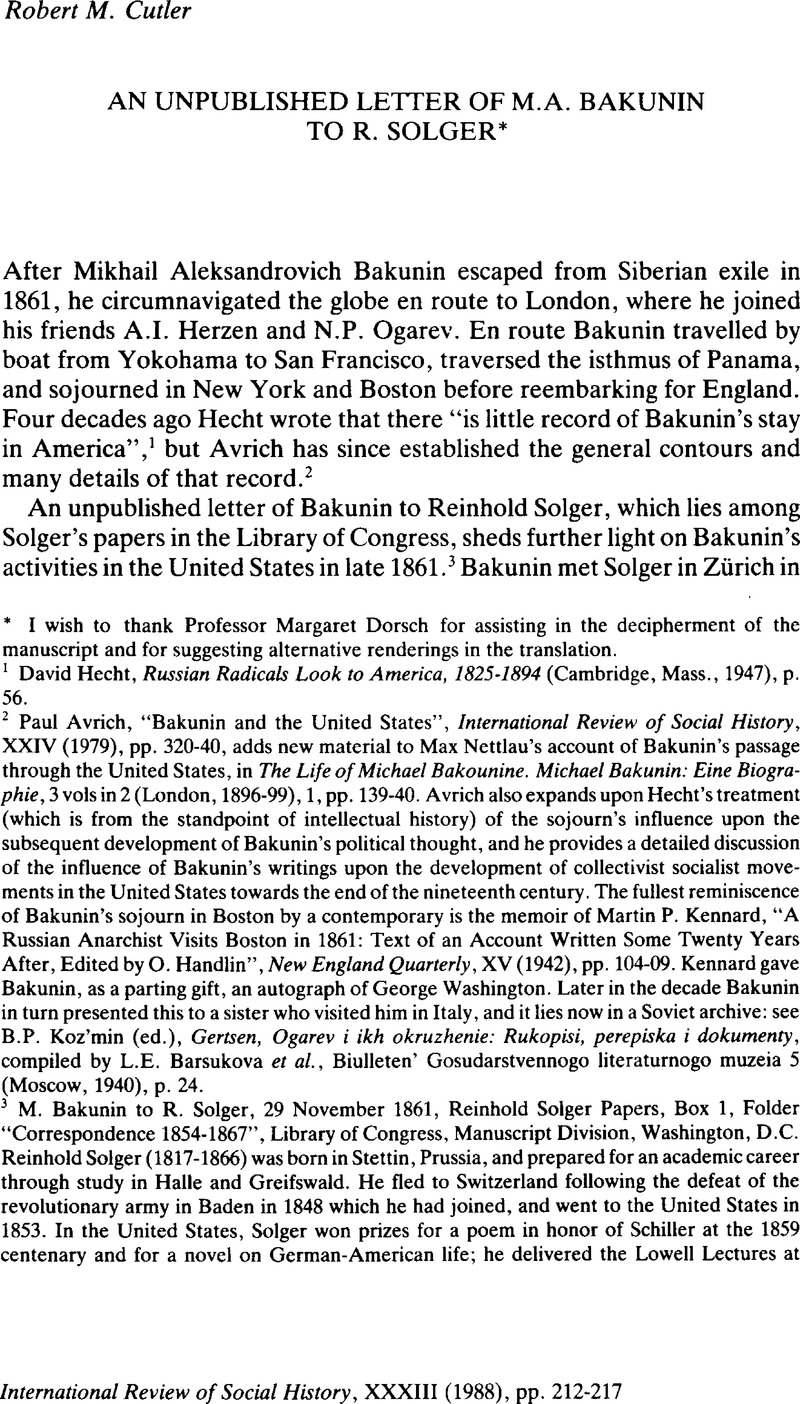No CrossRef data available.
Published online by Cambridge University Press: 18 December 2008

1 David, Hecht, Russian Radicals Look to America, 1825–1894 (Cambridge Mass., 1947), p. 56.Google Scholar
2 Paul, Avrich, “Bakunin and the United States”, International Review of Social History, XXIV (1979), pp. 320–40,Google Scholar adds new material to Max Nettlau's account of Bakunin's passage through the United States, in The Life of Michael Bakounine. Michael Bakunin: Eine Biographie, 3 vols in 2 (London 1896–1899). 1, pp. 139–40.Google Scholar Avrich also expands upon Hecht's treatment (which is from the standpoint of intellectual history) of the sojourn's influence upon the subsequent development of Bakunin's political thought, and he provides a detailed discussion of the influence of Bakunin's writings upon the development of collectivist socialist movements in the United States towards the end of the nineteenth century. The fullest reminiscence of Bakunin's sojourn in Boston by a contemporary is the memoir of Martin, P. Kennard, “A Russian Anarchist Visits Boston in 1861: Text of an Account Written Some Twenty Years After, Edited by O. Handlin”, New England Quarterly, XV (1942), pp. 104–09.Google Scholar Kennard gave Bakunin, as a parting gift, an autograph of George Washington. Later in the decade Bakunin in turn presented this to a sister who visited him in Italy, and it lies now in a Soviet archive: see Koz'min, B.P. (ed.), Gertsen, Ogarev i ikh okruzhenie: Rukopisi, perepiska i dokumenty, compiled by Barsukova, L.E. et al., Biulleten' Gosudarstvennogo literaturnogo muzeia 5 (Moscow, 1940), p.24.Google Scholar
3 Bakunin, M. to Solger, R., 29 11 1861,Google Scholar Reinhold Solger Papers, Box 1, Folder “Correspondence 1854–1867”, Library of Congress, Manuscript Division, Washington D.C., Reinhold Solger (1817–1866) was born in Stettin, Prussia, and prepared for an academic career through study in Halle and Greifswald. He fled to Switzerland following the defeat of the revolutionary army in Baden in 1848 which he had joined, and went to the United States in 1853. In the United States, Solger won prizes for a poem in honor of Schiller at the 1859 centenary and for a novel on German-American life; he delivered the Lowell Lectures at Harvard in both 1857 and 1859. Much of his income was derived from public lecture series and international-affairs journalism. Thus a journalist, novelist, poet, and gifted public speaker, Solger devoted his considerable talents to the cause of the Union against the Confederacy and on behalf of Abraham Lincoln's party. In recognition of this, the latter appointed him Assistant Registrar of the U.S. Treasury.
4 The 1844 letter first appeared in Russian translation, in Bakunin, M.A., Sobranie sochinenii i pisem, edited by Steklov, Iu.M., 4 vols (Moscow, 1934–1936), 3, pp. 236–38.Google Scholar (Steklov planned to publish a complete twelve-volume edition of Bakunin's Sobranie sochinenii i pisem but was prevented from this by enthusiasts of the Stalin school of historiography, who exiled him to the West Siberian labor camp where he died. Volumes 5 and 6, which had been prepared for the printer in Moscow in the mid-1930s, were suppressed before publication, and work in progress on subsequent volumes halted. According to an archivist formerly employed at a major Moscow library, all these materials should lie in the currently closed archive of the Izdatel'stvo vsesoiuznogo obshchestva politkatorzhan i ssyl'no-poselentsev, which is conversed in the Tsentral'nyi gosudarstvennyi arkhiv oktiabr'skoi revoliutsii and for which an index exists in the form of an unpublished diplomnaia rabota defended by a certain Aleksandr Iakushkin at the Moskovskii gosudarstvennyi istorik-arkhivnyi institut in or about 1966.) The original German text of Bakunin's 1844 letter to Solger has been published, with a useful commentary, by Edmund, Silberner, “über einige unveröffentlichte Briefe Bakunins”, Jahrbücher für Geschichte Osreuropas, VIII (1960), pp. 79–82.Google Scholar
5 However, he had little sympathy for its more radical circles. In Charles de Forster, , Du Royaume í l'empire (1848–1852): études politiques et philosophiques (Paris, 1854), pp. 108, 176–78, 264, 285,Google Scholar he criticized Feuerbach's adepts, equated socialism with anarchism, and attacked Proudhon's espousal of atheism. Forster preferred the existence of any authority to its absence, and monarchy to any other form of authority. Acknowledging that “Russia represents the monarchical principle in all its integrity”, he counted upon it for the possibility of reconstituting a Polish state consonant with his owsn political preferences, including first and foremost the guarantee of aristocratic privileges. See France et Europe: Six lettres tirées du portefeuille d'un homme politique (Berlin, 1849), pp. 18, 36, 46–48, 55–56, 71–72, and esp. p. 64; quotation at p. 62.Google Scholar This anonymously published brochure is attributed to Forster in Estreicher, Karol (ed.), Bibliografia poiska XIX stulecia, 2nd ed., 12 vols by 1979, (Kraköw, 1959– ), pp. 173–74;Google Scholar and also at p. iv of “Wydawnictwo poiskie w Berline”, an advertising postface to Sprawa poiska ze stanowiska europejskiego, compiled with a preface by Karol, Forster, Teka, Narodowa, Pisma historyczno-politiczne 2 (Berlin, 1872).Google Scholar In this 1872 publication Forster also reprinted, in Polish translation, Bakunin's long 1862 article “Russkim, Pol'skim i vsiem slavianskim druz'iam”, originally published as a Supplement to Kolokol, nos 122–23 (15 02 1862), pp. 1021–28,Google Scholar apparently using the French translation of the brochure as the basis for the Polish translation. Compare Bakounine, M.A., Á mes amEs russes et polonais (Leipzig, 1862);Google Scholar and Bakunin, M.A., “Do moich przyjaciól Rosyan i Polaków”Google Scholar, in Sprawa poiska ze stanowiska europejskiego, pp. 138–51.Google Scholar For Forster's criticism of that program, see his “Do czytelnika”, in Ibid. pp. ix–x.
6 Friednch, Kapp, “Reinhold Solger”, in Kapp, Aus und über Amerika: Thatsachen und Erlebnisse, 2 vols (Berlin, 1876), 1, p. 363.Google Scholar
7 Avrich, , “Bakunin and the United States”, p. 324.Google Scholar
8 Nettlau, , The Life of Michael Bakounine, 1, p. 139;Google Scholar “Bakunin, ôsugi, and the Yokohama- Paris Connection”, Libero International (Kobe, Japan), no 5 (1978), pp. 14–15.Google Scholar
9 Kennard, , “A Russian Anarchist Visits Boston in 1861”, pp. 107–08.Google Scholar
10 Published in Dragomanov, M.P. (ed.), Pis'ma MA. Bakunina k A. I. Gertsenu i N. P. Ogarevu (Geneva, 1896), pp. 78–79.Google Scholar